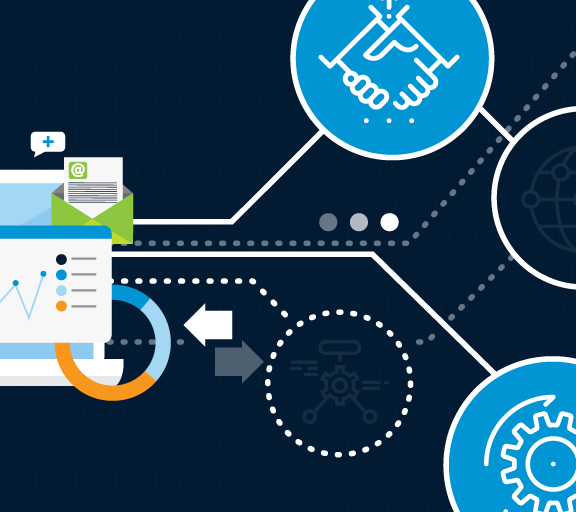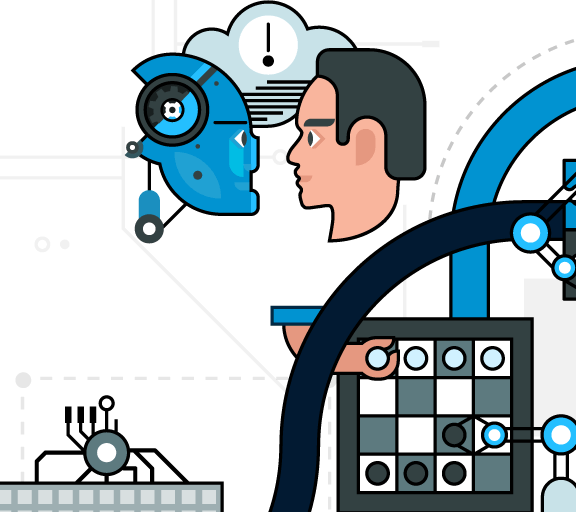The Notable Progression of AI & What it Means for Talent Acquisition

In today’s global economy, talent acquisition (TA) is a critical differentiator for a competitive enterprise. It’s never been clearer to employees and executives alike that talent is the real key to a company’s success and growth. To this end, we have watched the talent acquisition technology scene explode with dozens of new innovations, each one more promising than the last and each one promising to change the way we hire and work.
One of the most promising areas of innovation is artificial intelligence (AI). Perhaps no other development has more acutely captured the attention of the TA world than the concept of using AI in the TA cycle. Today, this underlying technology powers everything from job recommendations and resume parsing to chatbots and everything in between.
Staffing Industry Analysts and Talent Tech Labs (TTL) collaborated on creating an extensive joint report, capitalizing on the expertise of both organizations to conduct the most in-depth analysis of this TA tech powered by AI. Here’s a breakdown of the AI Summary Report key findings.
What Artificial Intelligence Is … and What it Isn’t
The term “artificial intelligence” is actually an overarching category with several more targeted terms falling under that heading:
- Machine Learning
- Natural Language Processing
- Chatbots
- Deep Learning
- Neural Networks
These are not the only types or examples of AI, but they are the most common within the lexicon of the TA industry. These categories aren’t mutually exclusive either, as AI-enabled technology is quite likely to combine a number of these elements.
73% of TA Tech Startups are Using Some Form of AI
Overall, 73% of TA tech startups stated they’re using AI in their software, according to the most recent survey conducted at TTL. However, keep in mind many of these startups are focused on early-stage applications of AI, such as machine learning and natural language processing, rather than the more advanced deep learning and neural networks. Because recruitment technology is moving past automation and into AI, we’re seeing vendors incorporate matching algorithms, recommendations, and predictive analytics into their solutions.
This movement is solidifying AI’s place in the TA tech market and making it almost a must-have for new entrants. Later-stage companies are dabbling in facial, voice, and writing recognition, and these advanced forms are made possible by deep learning and neural networks. We predict that, as these technologies evolve into more advanced forms of AI, a role reversal in recruitment will emerge.
As TA becomes more intelligent, the access to information recruiters have will put them in the position of being the hunted, not the hunter. Today, recruiters track down candidates, but in the future, we expect AI to turn the tables where job seekers will then seek out recruiters. AI won’t replace recruiters; it will empower them.
22% of TA Tech Startups Have Implemented Chatbots
The TTL survey revealed that 22% of respondents already have chatbots featured within their technology offering. While they receive a considerable amount of media attention due to their novelty, chatbots should be a separate conversation from the AI discussion. That’s because as things stand today, most chatbots, though interactive, simply draw responses from a predefined set of queries. That said, there is value in these tools to offload tasks and save time for recruiters, which aligns with some of the other benefits that AI can deliver.
Key Platform Players
One crucial consideration that will shape the application of AI to recruitment is the role the “platform players” will opt to pursue. These larger and more influential companies provide core infrastructure for large swaths of the market and have been amassing huge amounts of data over time.
With Google, IBM, Microsoft, Facebook, Amazon, and a few others having gathered vast sets of data and cloud infrastructure to promote deep learning and build neural networks, the looming question is the role they aspire to play in the recruitment space.
Several of these players are offering their cloud infrastructure for AI developers to use. Others are offering “AI as a Service” and allow startups to build solutions with plug-and-play machine learning algorithms they offer. Alternatively, any of these platforms could decide to build their own products and, by virtue of their scale, quickly capture share and leadership in the space. This disruptive specter hangs ominously over the workforce solutions ecosystem and has the potential to radically alter the competitive landscape.
Did you know?
Google has offered its AI-powered search capabilities via API to Monster, CareerBuilder, Glassdoor, and other select job boards to improve their respective search capabilities as a partner.
IBM, which pioneered Watson, has now released several new technologies into the TA space. Their recruitment solution leverages Watson to rank priorities of open job orders for recruiters. The system increases recruiter efficiency by prioritizing tasks that need attention. Machine learning analyzes applicant flow, previous recruiting funnel statistics, and other signals to indicate whether a job opening is on or behind schedule.
The degree of open API access or cloud hosting these platforms players choose to offer versus their own aspirations to build product will have dramatic effects on the ways AI is provisioned. As it now stands, the capabilities these companies offer to third parties will absolutely accelerate the development of new products and may even democratize the use of AI across the TA spectrum.
Talent Acquisition: 2022
While we’ve examined some of the more important aspects of how AI is bringing value to the TA function now, many other areas are ready to be explored. The shortest route to more complex functionality will be advances in applying unsupervised machine learning and truly contextual natural language processing.
As the existing tools become more mature, new capabilities that provide more insights or better predictions will drive new use cases and opportunities for increased penetration of these new technologies.
Download the full AI Summary Report to explore these points of discussion more.
Editor’s Note: As Allegis Group’s innovation partner, Talent Tech Labs (TTL) identifies and then assists emerging companies with breakthrough ideas to gain commercialization and scale. TTL is not only a unique accelerator but also the leading authority on emerging technology addressing talent acquisition.
Related Content
AI and the World of Work (white paper)
“That’s Not Real AI” and Other True But Misleading Observations
6 Allegis Group Leaders Named to SIA’s North American Staffing 100 List


